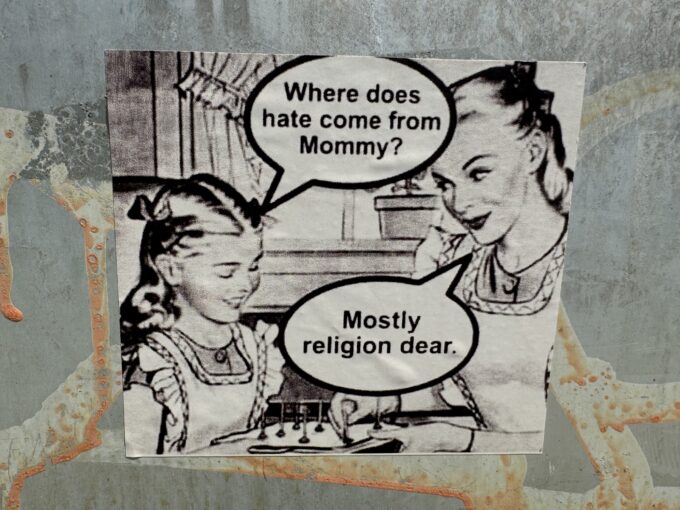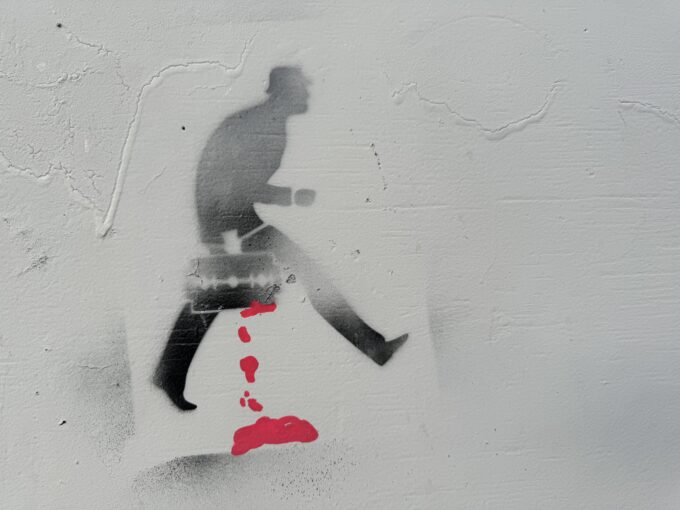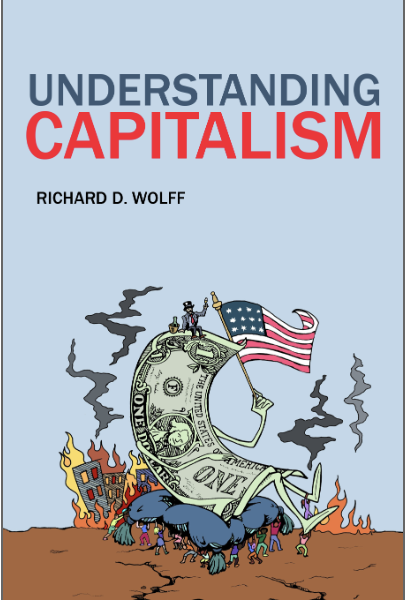Israeli Racism Shouldn’t Get a Pass in America

Photograph by Nathaniel St. Clair
In 2013, Justine Sacco, an executive at a New York public relations firm, sent a tweet in which she joked about AIDS among Black Africans. “Going to Africa,” her tweet said, “Hope I don’t get AIDS. Just kidding. I’m white!” The tweet, which went viral, was denounced as racist and, despite an abject apology, Sacco was fired from her job.
Amy Cooper earned a similar fate. In May, 2020, Cooper was roaming in New York’s Central Park when a male birdwatcher confronted her about her unleashed dog. Cooper then called the police. “There is a man, African American,” she reported, “and he is recording me and threatening me and my dog … please send the cops immediately!” For this racist ploy, Cooper was publicly condemned. She, too, ended up losing her job.
On July 8, 2024, the WRAL (Raleigh, NC) news website ran the headline, “Millions of Tax Dollars Going to a Company Accused of Racism. WRAL Investigates Why the State Still Hasn’t Taken Action.” The headline implies that what’s allegedly going on is wrong and should be investigated, presumably to stop state support for a racist enterprise.
These examples of anti-racist reaction suggest that as a society we’ve reached a point where public expressions of racism, as well as public support for racism, are unacceptable. One offensive joke can get you fired. Yet we now see an egregious double standard being applied in the U.S. when it comes to tolerance of and support for racism.
Imagine a revised version of that WRAL headline: “Billions of Tax Dollars Going to a Country Accused of Racism. Mainstream Media Coordinate Efforts to Investigate Why the Federal Government Still Hasn’t Taken Action.” Don’t hold your breath waiting for it.
The reality is that billions of U.S. taxpayer dollars are going to a country not only accused of racism, but which, as many see it, was founded on racist premises, still practices apartheid, and whose leaders have for decades made unabashedly racist public statements. That country is, of course, Israel.
Since October 7, 2023, blatantly racist statements by Israeli leaders have been widely reported. Israeli Prime Minister Benjamin Netanyahu likened Palestinians to Amalekites, an ancient tribe in Old Testament lore whom Yahweh told the Israelites to destroy—men, women, children, infants, and cattle. Israeli Defense Minister Yoav Gallant referred to Israel’s assault on Gaza as a fight against “human animals.” Other Israeli officials called for erasing Gaza from the face of the earth, claiming that no Palestinian civilians are innocent.
Cued by their political leaders, Israeli soldiers have released racist videos on social media celebrating their dominance of Palestinians and the destruction of Palestinian homes.
From the top echelons of government to army field units, Israeli racism has been on clear display to the world. These expressions of virulent racism mattered to the International Court of Justice, which took them as evidence of genocidal intent, but they did not seem to matter to U.S. political leaders, except perhaps as instances of bad optics.
Partisans of Israel sought to explain away these expressions of anti-Palestinian racism as uncharacteristic outbursts, products of the rage many Israelis felt in the aftermath of the October 7 attack by Hamas. There is no doubt some truth in this claim; anger conduces to saying hateful things. But the history of anti-Palestinian racism in Israel did not begin in 2023. In fact, it precedes Israel’s founding.
Theodore Herzl, one of the principal architects of political Zionism in the late 19th century, saw the native Arabs of Palestine as “primitive and backward,” according to Israeli historian Avi Shlaim. Herzl expected Palestinian Arabs to be grateful for the prosperity that a Jewish influx would bring to Palestine. Consistent with the ideological fantasies of earlier generations of European colonizers, Herzl imagined that Jews would merit credit for assuming the white man’s burden of civilizing the natives.
Other early Zionists differed in the degree to which they anticipated Arab resistance to the formation of a Jewish state in Palestine. But all accepted the principle that it ultimately didn’t matter what the indigenous people wanted. By use of military force backed by outside imperial powers (Britain; later the U.S.), and through diplomatic sidelining of Palestinian Arabs, Zionists aimed to create the ethnocratic state of Israel, regardless of the conflicting nationalist aspirations of Palestinians.
All this preceded WWII, the Holocaust, and the formal creation of Israel. The forcible displacement of 750,000 Palestinian Arabs from their homes and land—what we today would call “ethnic cleansing”—in the 1948 Nakba was largely a matter of putting into practice an idea rooted in political Zionism from the start: the lives, wishes, and well-being of the native Arab population would not be allowed to deter the creation of a Jewish state.
In one sense, little has changed since 1948. Successive Israeli governments have used different levels of violence to quash Palestinian resistance to colonial oppression, but all have adhered to the principle that Israel should be a Jewish state, run by Jews for Jews, with as few Palestinians as possible from the river to the sea. Nor has any Israeli government relinquished the idea that Palestinian desires for freedom and self-determination must be subjugated if necessary for Israel to exist as a Jewish state.
Today, the heir to this racist philosophy is Israeli Prime Minister Benjamin Netanyahu. Over thirty years ago, in his book A Place among the Nations: Israel and the World, Netanyahu slandered Arabs across the board, writing, “Violence is ubiquitous in the political life of all the Arab countries. It is the primary method of dealing with opponents, both foreign and domestic, both Arab and non-Arab.” Netanyahu goes on to call terrorism “the quintessential Middle East export,” saying that “its techniques everywhere are those of the Arab regimes and organizations that invented it.” Projection much?
To be clear, what makes Zionism racist are its implicit assumptions that the desires of Jews to live in freedom, safety, and dignity take precedence over Palestinian desires for the same things; that it is acceptable for a militarily powerful Jewish state to impose its will on a stateless and vulnerable Palestinian group; and that the goal of maintaining a Jewish state trumps the basic human rights of Palestinians.
Anti-Palestinian racism helps to legitimate these ideas and is further reinforced when it is invoked, as by Netanyahu and other Israeli leaders, to justify violence and the daily humiliation of apartheid. These are not radical observations. In much of the world, outside the sphere of U.S. influence, Israel’s anti-Palestinian racism is plain as day, and what I’m saying here would be uncontroversial.
So when other expressions of racism are unacceptable in the U.S. today, why does anti-Arab Israeli racism get a pass? Why isn’t Israel shunned as a pariah nation, as South Africa once was, for denying the human rights of Palestinians and the immorality of its ethno-supremacist practices?
One answer is that realpolitik rarely bends to morality. As secretary of state and former army general Alexander Haig once put it, Israel is like an unsinkable American aircraft carrier in the Middle East, projecting power in a region of great economic importance to the U.S. ruling class. Relative to the larger geopolitical stakes at play in the region, the fate of a stateless Arab minority is not that important, except as a potential source of instability. If this source of instability were somehow made to go away, many U.S. political leaders would be perfectly happy, regardless of the racism embedded in the solution.
Another reason many Americans are willing to tolerate Israeli racism is that the two nations are seen as sharing a similar origin story, one that makes racist crimes forgivable.
Just as European colonists once sought freedom from popes and kings by forging a new nation in North America, Jews sought freedom from pogroms and antisemitism by creating a Jewish state in the Middle East. Yes, some indigenous people got hurt in the process, and that’s a shame. But this suffering pales when weighed against the benefits America and Israel have brought the world. What’s more, after the Holocaust, Jews have an undeniable claim to seek their own version of Manifest Destiny. So the story goes.
Those who accept this settler-colonial mythos—underscored by biblical fables, post-Holocaust guilt, and devaluing of a racialized Other—may have trouble seeing what Israel has done and is doing to the Palestinians as wrong. It will be admitted that maintaining an ethnocratic Jewish state is ugly, even bloody, at times; but the ends justify the means.
Nor should we forget that anti-Arab racism abounds in the U.S. as well as Israel. Americans are thoroughly propagandized to accept the stereotype of Arabs as terrorists, or as Islamic fanatics rooted in a regressive medieval culture. The racist Israeli view of Arabs thus fails to shock in the U.S., fails to shock as it should, because the same view is normalized here. Our “special relationship” with Israel is built in part on this shared infection with the virus of colonial racism.
Israel’s anti-Palestinian racism is a glaring example of the dehumanization that racism entails and the murderous brutality racism enables. This is what the world has seen play out in Gaza these last ten months. There could be no better example, right now, of why Israeli racism should not get a pass in the U.S., nor anywhere, ever again.
Born and Dwells in Violence: Israel’s Mission in the Middle East
The future is uncertain for a country birthed in violence and that lives an ethos of violence.
The Middle East has known more than its share of tragedy and grief since 14 May 1948. On that date, Israel proclaimed itself a state in Palestine and within minutes, U.S. President Harry S. Truman recognized its provisional government as the de facto authority of the new Jewish state in the heart of the Islamic world.
The hegemonic goals of the United States and Israel have converged since the end of the Second World War. Both have regarded the domination of Muslims and their governments as central to their imperial and regional interests.
The world order they envisioned, however, did not correspond with the national interests of the natives of Palestine and their determination to resist dispossession and the occupation of their land by European Zionists.
Peaceful coexistence had no place in the envisioned Eretz Israel colonial project. And peace has not been America’s legacy in the region since it emerged as a post-war imperial power.
Although Israel’s leaders have publicly professed a desire for peace, they have continually obstructed constructive deliberations and initiatives, and have instead initiated expansionist wars, illegally occupied the land of others and contributed to the militarization of the region.
For seven decades, U.S.-sponsored peace plans, accords and negotiations have provided cover for Israel as it has executed its settler-colonial project. Even today, as the leading medical journal, Lancet (July 2024), reported a death toll in Gaza that could exceed 186,000 or more, Washington continues to affirm its “ironclad” support for Israel’s killing fields in Gaza. American financial, diplomatic and military support have encouraged Israel to become the brutish villain it is today.
After the October Gazan prison break, Israel has used the weapon it has always relied on—violence—to destroy the desire of Palestinians for freedom from Zionist oppression. It has unleashed its genocidal violence on a people and a strip of land, with a 4,000-year history, once ruled by various dynasties and empires.
Palestinian leaders, too, have not escaped Israeli violence. Tel Aviv has a history of assassinating the leadership of the resistance. The latest casualty was Ismail Haniyeh, Chairman of Hamas’s Political Bureau, assassinated in Tehran on the last day of July. Five months earlier, Marwan Issa, deputy commander of the military wing of Hamas, was assassinated in Gaza. Before them, Hamas’s co-founders, Abdul Aziz al-Rantisi and Sheikh Ahmed Yassin (confined to a wheelchair most of his life) were killed in Gaza in 2004.
Israeli violence has not been limited to Palestine. Since October 2023, the Israeli military has killed at least nine leaders and military commanders in Lebanon, Syria and Iran.
On 30 July 2024, Israel struck a residential area in southern Beirut, killing senior Hezbollah commander, Fuad Shukr. And on the same day, the United States carried out an attack on a base south of Baghdad operated by Iraq’s Popular Mobilization Forces, leaving four dead and many injured.
The People’s Democratic Republic of Yemen, with a long history of support for Palestine, has also felt the wrath of the United States. In early November 2023, in response to Israel’s bombardment and siege of Gaza, Ansar Allah (Houthis) began a concerted campaign to disrupt Red Sea shipping. Since then, the United States has launched airstrikes across Ansar Allah controlled areas of Yemen.
According to Saudi Arabia’s Al Arabiya, the airstrikes (20 July) on a fuel depot and oil refineries at the Red Sea port of Hodeidah—Yemen’s economic lifeline—were carried out in a joint operation by Israel, the United States and Britain. The attack on the country’s vital port sparked a huge blaze, killing six and wounding 87 Yemenis.
Given Washington’s complicity with Israel’s genocide, it was obvious that intervention by another world power was needed. Palestinians welcomed The People’s Republic of China’s invitation to broker reconciliation talks. After three days in Beijing, 14 Palestinian groups signed a unity agreement on 23 July 2024.
The agreement, calling for the formation of an interim national reconciliation unity government to take charge of post-war Gaza and the West Bank, was rebuffed by the Biden administration. Instead they reiterated their desire to see the Palestinian Authority—rejected by the vast majority of Palestinians—with the governing role in Gaza.
Also, predictably was the White House’s disregard for the landmark ruling by the International Court of Justice on 19 July 2024 that laid out a comprehensive plan for peace, justice and security for all in Palestine-Israel.
As history reveals, Israel has maintained its residency in the Middle East through violence. In addition, U.S.-Israeli domination has relied on conflict and regional division to sustain that dominance.
As Washington deepened its involvement in the region, it viewed attempts at unification as threats to U.S.-Israel interests and supremacy—not unlike its perception of political Islam today.
America’s determination to control events was asserted in the Eisenhower Doctrine of 1957, which called for an expanded role for the U.S. military in the region. The doctrine reflected hostility toward and desire to contain the growing influence of pan-Arab nationalism, as well as fear over the presence of the then-Soviet Union.
By 1957, pan-Arabism— an ideology that advocated for Arab cultural, political and socioeconomic unity—had become the dominant ideology in the Arab world and Egyptian President Gamal Abdel Nasser (1956-1970) its undisputed leader.
Under Nasser’s leadership, Egypt and Syria joined together in 1958 to form the United Arab Republic, a union which lasted until 1961. The focus of the Arab Nationalist Movement was on unity, avenging the loss of Palestine and on opposition to colonialism and Western imperialism.
Arab nationalism, already weakened, was severely undermined by the humiliating defeat of Egypt and Syria by Israel’s preemptive war in 1967, which ultimately led to Nasser’s decline and erosion of the movement. It is important to note that the United States supplied armaments to Israel during the war.
Arab unity has never recovered; instead, countries like Egypt and Jordan have become U.S. welfare states and oil-rich Arab dictators have become regional clients of Washington and Tel Aviv. And the United States has come to see the region solely through the prism of preserving Israel at all cost.
The resolve of Palestinians, as they battle against U.S.-Israeli domination, represents the hoped for nationalism that appealed to and once stirred large segments of the Arab world.
The political class in the United States has been indifferent to the aspirations of 500 million Muslims in the Middle East, but has instead devoted its resources, prestige and support to one state with a population of some 7.5 million non-Muslim Israelis.
Israel’s Zionist founders did not come in peace. They fashioned a country based on force and intimidation. With each decade, their progeny have intensified the violence. Emboldened, they no longer disguise their long-sought after mission to ethnically cleanse Palestine. And the tragedy for America, is that it has chosen to be a partner in that mission.
The U.S. and Israel have tried mightily to make Palestinians futureless; but they have always underestimated their strength and the 4,000-year history that has planted them firmly in Palestine.


